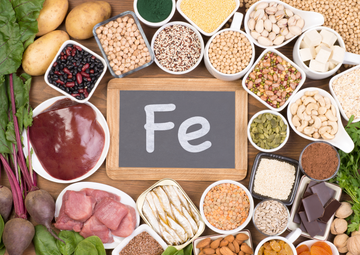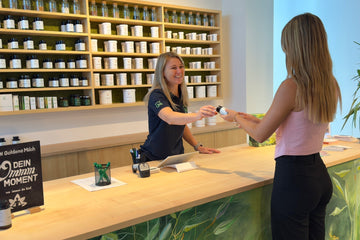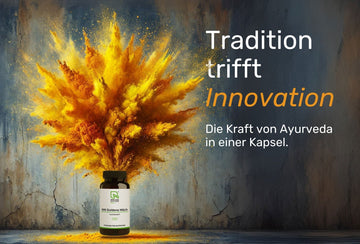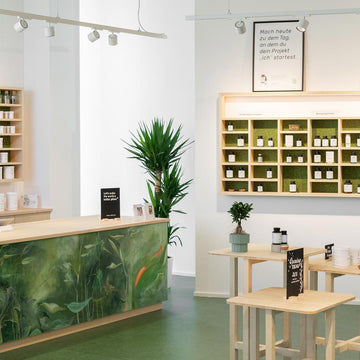Iron's best-known function is the formation of hemoglobin, the red blood pigment that transports oxygen from the lungs to all cells in the body. But iron is much more than just an oxygen carrier: It helps with energy production, protects the immune system, and plays a key role in the formation of neurotransmitters in the brain, such as dopamine and serotonin.
The body needs more iron, especially during periods of increased need, such as during growth, pregnancy, or physical exertion. Women with heavy periods also regularly lose larger amounts. Accordingly, iron requirements vary from individual to individual and depend heavily on lifestyle, age, and diet.
Iron – the underestimated trace element that moves everything
Iron is small but mighty: Without this trace element, virtually nothing functions in our bodies. It is needed for oxygen transport in the blood, is involved in cellular respiration, supports the immune system, and even plays an important role in our brain. Nevertheless, iron deficiency is one of the most common nutrient deficiencies worldwide – even in wealthy countries like Austria and Germany.
A deficiency often develops gradually and goes undetected for a long time. In this article, we'll show you why iron is so important, how to recognize a deficiency, and how you can specifically adjust your diet, even (or especially) if you follow a plant-based diet. You'll also learn how high-quality iron supplements like NN Iron II or NN Iron Vegan can provide targeted support.
When the memory is empty: This is how a deficiency becomes noticeable
Because the symptoms often develop slowly, they are easily overlooked or attributed to other causes. It often begins with general fatigue, difficulty concentrating, or pale skin. As the condition progresses, it can lead to brittle nails, hair loss, headaches, dizziness, or shortness of breath.
A clear warning sign: If you constantly feel exhausted despite getting enough sleep, it's worth getting a blood test. These blood tests assess your iron status by measuring levels such as ferritin (storage iron), hemoglobin, and transferrin saturation. Even a low ferritin level can provide initial clues, even without anemia.
An iron deficiency can also affect mental well-being. Exhaustion, inner restlessness, or low moods can also be caused by an iron deficiency. Iron is important for the production of neurotransmitters that regulate our mood. Therefore, anyone who feels emotionally unbalanced, listless, or irritable should also monitor their iron levels, especially if physical symptoms such as fatigue occur at the same time.
Sport and iron: When training suddenly becomes difficult
Even physically active people, especially endurance athletes, are susceptible to iron deficiency. Iron is lost not only through sweat, but also through minor gastrointestinal bleeding or through so-called "running hemolysis," in which red blood cells are destroyed by shock.
If you train regularly but feel tired and weak, it's worth taking a look at your iron status - especially during competition phases or intensive training blocks.
How to support your iron levels with the right diet
Many foods contain iron, but not all iron is absorbed equally well. The body can utilize so-called heme iron from animal products like meat or fish much better than non-heme iron from plants. Nevertheless, you can still achieve a lot with a plant-based diet if you know what's important.
Tips for better iron absorption:
- Combine iron-rich foods such as lentils, quinoa or millet with vitamin C-rich ingredients such as bell peppers, lemon juice or fresh fruit.
- You should avoid coffee, black tea, and dairy products around the time you take your iron supplement, as they inhibit iron absorption.
- Fermented foods (e.g. B. sourdough bread, tempeh) or sprouted legumes improve bioavailability.
What vegans in particular and vegetarians should consider
Without animal products, you only absorb non-heme iron, which is less readily available but not impossible to utilize. Particularly good plant-based sources of iron include:
- Legumes such as lentils, chickpeas and black beans
- Millet, quinoa, oat flakes
- Pumpkin seeds, sesame, linseed
- Tofu, tempeh
- Green leafy vegetables such as chard, broccoli
- Dried fruits such as apricots or figs
If you follow a purely plant-based diet, it's worth regularly checking your iron levels. A natural product like NN Iron Vegan can be a useful supplement: It provides readily available iron from curry leaf extract combined with vitamin C from rose hips —purely plant-based, free from synthetic additives, and well-tolerated.
Tip: Take NN Iron vegan ideally before a meal with a glass of water, without coffee or milk. Foods containing vitamin C also support absorption.
Iron during pregnancy: double the need, double the responsibility
During pregnancy, iron requirements nearly double. The body produces more blood, the placenta needs to be supplied, and the developing child also needs iron for growth and blood formation. A deficiency during this sensitive period can increase risks such as premature birth or low birth weight.
Many pregnant women develop a deficiency despite a healthy diet. During this time, it's especially important to pay attention to your iron levels.
When nutritional supplements can be useful
Nutrition is not always sufficient – for example, in cases of chronic deficiency, severe blood loss, during pregnancy, or with a vegan diet. In these cases, targeted supplementation may be beneficial.
NN Iron II was specially developed for situations with increased needs. It combines high-quality bivalent iron with vitamin C and copper – for improved absorption and optimal utilization in the body. L-cysteine and OPC complement the formula as modern active ingredients.
NN Iron vegan is aimed at those who value natural, purely plant-based ingredients. It contains iron from curry leaf extract, supplemented with vitamin C from rosehip extract – entirely without synthetic additives. The formula is particularly well-tolerated and ideal for vegans , vegetarians , or people sensitive to traditional iron supplements.
Both products support:
· the normal formation of red blood cells and hemoglobin
· oxygen transport and energy metabolism
· the immune system and the reduction of fatigue
Note: Pregnant and breastfeeding women should consult a medical professional before taking this product.
Tip for your everyday life:
It's best to take iron supplements with a glass of water in the morning or at lunchtime before a meal. Drinks containing vitamin C, such as orange juice, aid absorption. Avoid coffee, tea, and dairy products around the time you take iron supplements, as they can inhibit iron absorption.
Conclusion: Keep an eye on iron and provide targeted support
Iron is a small trace element with a big impact. A lack of it can lead to many things becoming unbalanced—from physical performance to mental well-being. This makes it all the more important to pay attention to warning signs and plan your diet consciously. Eating a balanced diet, using vitamin C-rich supplements, timing your coffee and other beverages wisely, and regularly listening to your body can contribute significantly to your iron intake. Regular monitoring is particularly worthwhile for vegan or vegetarian diets, physically active individuals, pregnant women, or women with heavy periods.












